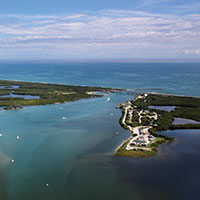 Sebastian Inlet Park may drop its fees for some
Sebastian Inlet Park may drop its fees for some
STORY BY HENRY A. STEPHENS
Beginning next year, more than 20,000 residents of the northern part of Indian River County may be able to fish from or visit the Sebastian Inlet State Park free or for a reduced charge.
A proposal to lower or eliminate fees for people who live in the Sebastian Inlet District – most of them in Brevard County, but some in Indian River – is in a bill state Rep. Randy Fine (R-Melbourne Beach) is filing for the Legislature’s 2020 session.
The Indian River County portion of the Inlet District includes the barrier island north of Old Winter Beach Road and some unincorporated country plus the City of Sebastian on the mainland.
The bill, after expected modifications, would either eliminate or discount the park’s $8-per-carload admission fee – as well as the lesser fees for bicyclists, pedestrians and single-occupant cars – for Inlet District residents.
How to make the proposed change work, since the Inlet District doesn’t own the state park, will be a challenge for the legislative staff and committees before it ever reaches the House or Senate floor.
“It started in June when a fisherman came to me and said this just isn’t right,” Fine said recently. “He said, ‘I pay my taxes to the Inlet District. But every time I want to go fishing, I have to pay to go into the park.’ … Nobody should have to pay taxes twice.”
State Sen. Debbie Mayfield (R-Melbourne), whose Senate District 17 includes both sides of the park and the Inlet District, noted the complexity of the jurisdiction.
“The Sebastian Inlet District maintains the inlet and the jetties, but the Sebastian Inlet State Park is totally separate,” she said. “It maintains the public fishing pier and the park itself.”
She suggested a discount for Inlet District residents instead of free admission, a compromise Fine said could be agreeable to him.
The state legislative delegations of Indian River and Brevard counties both took votes in favor of Fine’s bill.
But it should be a statewide “general bill,” Mayfield said, since it really targets how much money Sebastian Inlet State Park can send to the state after letting district residents in at free or reduced rates.
According to the Florida Department of Environmental Protection, which governs state parks, Sebastian Inlet State Park took in $1.8 million between July 2018 and June 2019 and spent $1.3 million on park maintenance, personnel and other operations.
That makes a difference of about $500,000, which goes to the DEP in a trust fund to support all state parks.
That’s the part that would be affected by the free admissions, Fine said.
Meanwhile, the Florida Department of Transportation announced last week that the Sebastian Inlet Bridge, which carries Highway A1A over the popular boating and fishing inlet and connects the two halves of the state park, is structurally deficient and will have to be replaced within the next six years.




